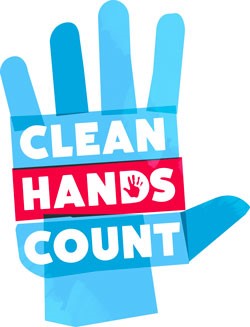

The science is clear: clean hands can protect patients and healthcare providers from dangerous and deadly infections. Yet, studies show that on average, healthcare providers clean their hands less than half of the times they should. 1
CDC’s Division of Healthcare Quality Promotion often receives inquiries from healthcare providers and staff asking for clarification on CDC recommendations and guidelines, including hand hygiene in healthcare facilities. The following are a few of the most commonly asked questions on hand hygiene.

The bottom line: Clean hands can protect patients and healthcare providers from dangerous and deadly infections, so clean your hands before and after every patient contact!
On May 5th, in celebration of World Hand Hygiene Day, CDC rolled out a new campaign called Clean Hands Count that answers these questions and more. Learn more about CDC’s Clean Hands Count Campaign: http://www.cdc.gov/handhygiene/campaign/index.html.
Comments listed below are posted by individuals not associated with CDC, unless otherwise stated. These comments do not represent the official views of CDC, and CDC does not guarantee that any information posted by individuals on this site is correct, and disclaims any liability for any loss or damage resulting from reliance on any such information. Read more about our comment policy ».
Sandra Young says:Can you hand sanitize your gloved hand with an alcohol based hand sanitizer? Is this practice OK to do occasionally/never? Thanks
Annie Schneider says:Can I effectively re-use disposable nitrile gloves if I clean them with hand sanitizer? Does the hand sanitizer break the gloves down?
Mark David says:Sir, you have given the best advice. As, I have seen many of nurse in hospital don’t care to wash their hand again and again. If Alcohol based hand sanitizer & hand glove use in hospitality, many people can get protected from any other diseases.
Estrellita Nera says:Very helpful and will utilize with Staff Huddles starting today!
Thank you…
We as health professionals preach “Good Hand Hygiene” until we are blue in the face and HCWs are compliant while they are being observed, but does just the opposite when we are not looking. How do we get HCW to understand that this is a serious, and potential life-threating matter, so that the correct and proper hand hygiene is performed as it should be?
Arthu says:Restrooms at restaurants generally have a sign proclaiming, “Employees MUST wash hands before returning to work.” By implication, management considers it is OK for non-employees not to wash their hands.
Casual observations have revealed that about one-third to one-half of all persons leaving a public restroom do not wash their hands. Why not advocate and post a sign in every public restroom, that applies to all persons, in all locations, stating, “WASH HANDS AND DRY THEM BEFORE LEAVING RESTROOM” ? That might promote better hand-hygioene and thereby lessen a preventable, transmissible public health problem.
Thank you for the advice . Sometime with daily work we forget about simple thinks like protect are self like cleaning are hands small think made the different. Thank you please keep me informed
BENARD MANGO says:hi, thanks for the touching text on hand hygiene. i am looking forward to launch a sensitization campaign on the same in Kenya health facilities.
K. C. says:I think you should reword the point about C. difficile. Saying wear gloves makes it seem like that’s all that is needed when working with infected patients and/or their environments and hands are to only be washed when there is a c. diff outbreak. Hands should be washed with soap and water always with c. diff patients in addition to gloves being worn.
Rochelle Odell says:Before losing my career in Nursing due to Complex Regional Pain Syndrome, due to recurring right hand infections due to MRSA which reared its ugly head in 2002-2005, Staph or Cellulitis, knowing I have a bug inbetween my right middle and ring finbers, remembering my clean hands requirements as an ICU Nurse Tech, the hospital had strict hand guidelines. Now that I still battle whatever bug is between the webbing and has spread partially up my hand, I use both soap and water, then hand sanitizer. When going into a doctors office I use my own pen as whatever bug is in there, I don’t want anyone else to get whatever is hiding. I wash my hands before handling dishes or food. It may be overkill, but bacteria can be spread by touching anything someone following me could pick up. Recently, I had what looked like dry skin when food shopping and when I picked up something heavy, I noticed a small amount of puss pop up. I bought a dressing kit and put it between my fingers. When I got home, the case of water someone helped me with I use my left hand. As I brought it into my home, it dropped and being r. hand dominant, when the case dropped onto my feet, I automatically grabbed it without thinking and it was like a volcano erupted with pus and blood. I haven’t seen my new PCP yet and knowing my closest hospital is only three miles from me, I didn’t take a taxi because their care is poor at best so I would put gloves on after washing my hand which is impossible since my r. middle finger now lies in my palm three years post op hand surgeon who was the Director of a large University Hospital. We did not discuss him placing three, three inch pins in three of my fingers for six weeks. He didn’t read you never immobilize a CRPS patients extremity. or I would never agreed to the surgery. At any rate I cleaned out the area with Peroxide and sterile saline. I was washing my hands before’ and after using the bathroom. The only antibiotic I can take is Cubicin. I am now allergic to almost every antibiotic, finally including Vancomycin after being on it after 17 years. The only fast food restaurant I ever use is Subway because their employees have to wash their hands before putting gloves on. I think all fast food restaurants were required to use the same guidelines. I think if the CDC were to do a surprise visit to any place serving food and do hand and nail checks, most would lose their business when the tests came back. They handle food, then take a customer’s money and handle food again without washing their hands.